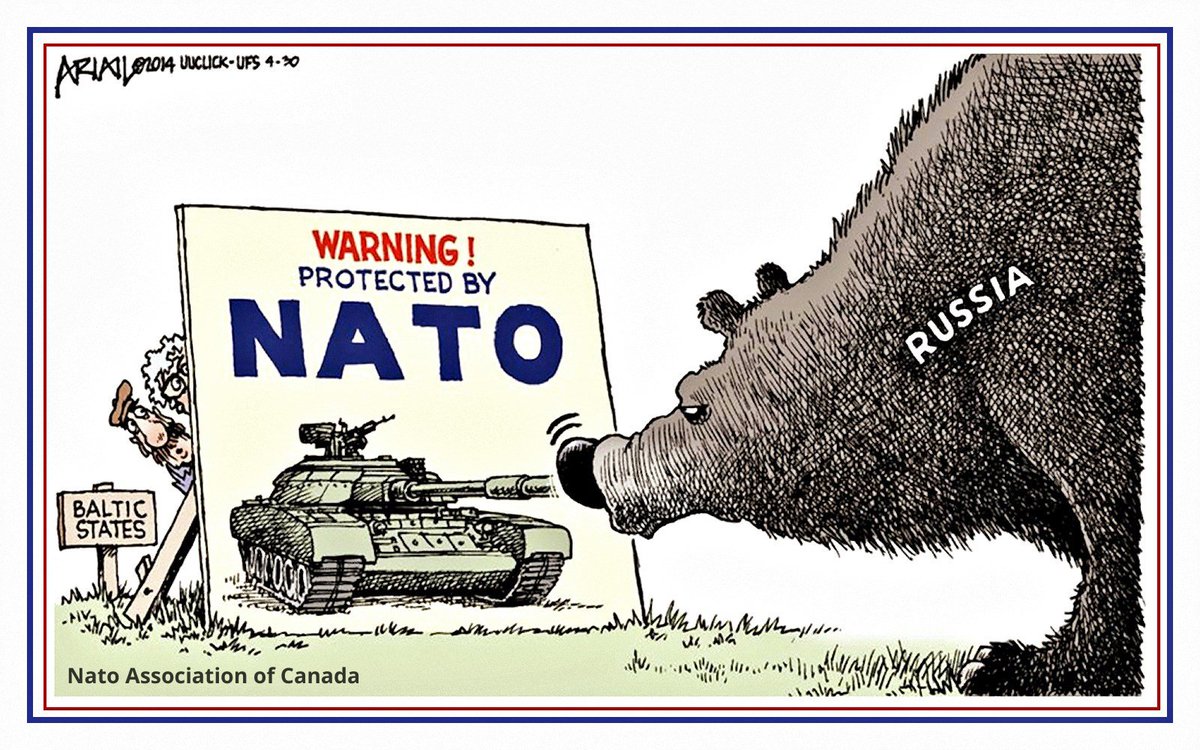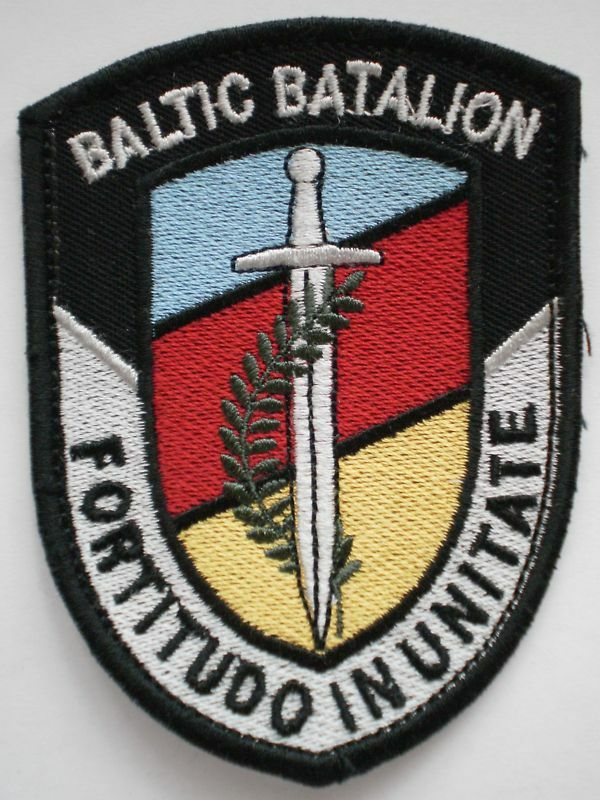The Ukraine crisis has folks questioning @NATO's post-Cold War expansion into Eastern Europe, especially former Soviet Republics (namely the Baltic states of 🇪🇪🇱🇹🇱🇻).
So how exactly did the Baltics get into NATO?
[THREAD]
So how exactly did the Baltics get into NATO?
[THREAD]

Estonia, Lithuania, and Latvia are currently the only former Soviet Republics in @NATO. They became members in 2004, along with Bulgaria, Romania, Slovakia, and Slovenia. 

Regardless of whether there was a promise to never move NATO "one inch" eastward after the Cold War, neither the Soviets or the Americans, in 1990, likely envisioned NATO expanding into former Soviet Republics.
amazon.com/Not-One-Inch-P…
amazon.com/Not-One-Inch-P…
Russian President Boris Yeltsin had made Russia's opposition to such extreme expansion very clear. In a 1995 speech, he said:
"Those who insist on an expansion of NATO are making a major political mistake. The flames of war could burst out across the whole of Europe."
"Those who insist on an expansion of NATO are making a major political mistake. The flames of war could burst out across the whole of Europe."

More explicitly, he said,
“I’m against NATO enlargement. When NATO approaches the borders of the Russian Federation, you can say that there will be two military blocs, and this will be a restoration of what we already had.”
“I’m against NATO enlargement. When NATO approaches the borders of the Russian Federation, you can say that there will be two military blocs, and this will be a restoration of what we already had.”
US President Bill Clinton seemed to echo that message:
“We’re trying to promote security and stability in Europe. We don’t want to do anything that increases tensions”
“We’re trying to promote security and stability in Europe. We don’t want to do anything that increases tensions”

But when the Baltic states gained independence from Russia in 1991, NATO membership was immediately a policy goal.
Indeed, the Lithuanian President was so bold as to directly "apply" for NATO membership via a letter (which had never been done).
(👇 is from the NATO archives)
Indeed, the Lithuanian President was so bold as to directly "apply" for NATO membership via a letter (which had never been done).
(👇 is from the NATO archives)

As then Lithuania Minister of Defense Audrius Butkevičisus said in a later interview:
“What we needed was a vision for the impossible”
“What we needed was a vision for the impossible”

Fortunately for the Baltics, they were not alone in their desire to improve their security and *possibly* join @NATO (though no promises).
The Nordic countries, especially @NATO
member Denmark, was keen to help.
The Nordic countries, especially @NATO
member Denmark, was keen to help.

Denmark, along with the other Nordic countries, signed the "Mariehamn Declaration" in November 1991.
Below is an image of the Finnish version of the declaration (via the Finnish Parliament archives)
Below is an image of the Finnish version of the declaration (via the Finnish Parliament archives)

The declaration stated: “The Nordic countries should actively seek to influence European and other developments. . . in the Baltic Sea and Baltic region”
In other words, the former Soviet Republic Baltic states couldn't be left out on their own.
In other words, the former Soviet Republic Baltic states couldn't be left out on their own.

Denmark, as both a Nordic state and a @NATO
member, took the lead (particularly Danish Foreign Minister, Uffe Ellemann-Jensen)
The goal was for the Baltics, if possible, to enter @NATO.
member, took the lead (particularly Danish Foreign Minister, Uffe Ellemann-Jensen)
The goal was for the Baltics, if possible, to enter @NATO.

Since immediate NATO membership was closed, a first step would be for the Baltics to demonstrate their "value added" as members.
By the mid-1990s, due to the Balkan Wars, NATO was focusing on deploying Peacekeeping operations.

By the mid-1990s, due to the Balkan Wars, NATO was focusing on deploying Peacekeeping operations.


This presented an opportunity. Denmark, with help from the other Nordic Countries and a few other nations (namely the UK), Estonia, Latvia, and Lithuania formed the Baltic Peacekeeping Battalion (BALTBAT). 

BALTBAT allowed the Baltic states to accomplish three objectives.
First, it allowed them to receive Western supplies to begin rebuilding their military forces. As Garry Johnson, Commander-in-Chief of Allied Forces Northern Europe, said:
"They were starting from zero"
First, it allowed them to receive Western supplies to begin rebuilding their military forces. As Garry Johnson, Commander-in-Chief of Allied Forces Northern Europe, said:
"They were starting from zero"

Second, it allowed the Baltics to gain training in an area that could be perceived as valuable to NATO (& also valuable to Russia, as maintaining peace in the Balkans was a priority). Indeed, their first deployment was alongside Denmark. 

Third, it "signaled" to @NATO, namely the USA, that the Baltics could be "good citizens" if allowed in @NATO. As a 1999 editorial in the Norwegian paper @Aftenposten remarked, "BALTBAT almost functions as a preparatory school for NATO membership"
This set the stage for the Baltics to enter the "Partnership for Peace" and then the "Membership Action Plan" 

Following the 9/11/2001 attacks on the United States and the start of the War in Afghanistan, the Baltics were eager to participate in ISAF 



So at the Prague NATO summit in 2002, the 19 NATO members voted to bring in the Baltic states. Here is the announcement in the official post-summit press release. 

In some ways, the Baltic states pursued the same strategy as Turkey in the 1950s: take costly actions to demonstrate willingness to be a good NATO ally (which @mephenke describes in her book)
amazon.com/Constructing-A…
amazon.com/Constructing-A…
All of the above helped the US to no longer be concerned about Russian reactions to Baltic accession to NATO.
Indeed, US officials had changed their view on the issue by the late 1990s. As US deputy secretary of state Strobe Talbott remarked during a 1997 speech at @Stanford:
“Quite bluntly, the Russians need to get over the neuralgia on this subject [of Baltic membership]"
“Quite bluntly, the Russians need to get over the neuralgia on this subject [of Baltic membership]"

So that's how the Baltics "got in". As @AndrisBanka wrote in @WarOnTheRocks back in 2019: "The Baltic countries played their hand expertly"
warontherocks.com/2019/10/the-br…
warontherocks.com/2019/10/the-br…
A little help from Denmark, some fortunate circumstances, and a lot of foreign policy initiative made it possible for the Baltic states to be the first (and, in my view, the last) former Soviet Republics to enter NATO.
[END]
[END]
Addendum: If you think you've heard me tell this story before, I have!
It was part of my #NATO7for70 series back in 2019...
It was part of my #NATO7for70 series back in 2019...
https://twitter.com/ProfPaulPoast/status/1114506236408496129
...and I had a chance to talk about it on the @Freakonomics podcast! Honestly, I just like saying "BALTBAT" :)
freakonomics.com/podcast/speak-…
freakonomics.com/podcast/speak-…
• • •
Missing some Tweet in this thread? You can try to
force a refresh












